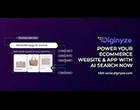
A study by Statista suggests that e-commerce sales will reach $4.2 Trillion by December 2020 and $6.5 Trillion by 2023. Unnecessary to make reference to, where there is cash included, lawbreakers follow. If you own an eCommerce business, you must be aware of the cyber threats and different security protocols. The lack of knowledge about the threats and effective security measures have contributed to $2.5 billion losses in 2014. It is estimated to reach $6.4 billion by 2018. These figures emphasize the importance of adopting security measures to keep your business safe and profitable.
Would you like to know what are the security measures adopted by e-commerce marketers? If that sounds, yes, this post guides you through the same and more.
5 Important Types of Cyber Security Threats You Must Know About
The cyber security threat landscape has evolved over the years, along with the growth of digital technologies. The following are the five important types of cyber security threats that you need to be aware of.
1) Phishing:
This is one of the major security threats that most eCommerce businesses and their customers face regularly. The hackers use social media, email, phone calls, and SMSes to steal valuable and sensitive data from customers. The hackers often trick customers to believe that they represent a bank or any legitimate business and convince customers to divulge their sensitive information.

2) DDoS Attack:
Distributed Denial of Data Service (DDoS) occurs when the server, network traffic, or service is affected due to traffic overcrowding. The hackers often execute DDoS attacks using more than one IP address or machine. During this attack, the users are denied access to the machine resource or network because the cyber threat actors control them.
3) SQL Injection:
This is a type of code injection technique, wherein malicious SQL code is injected into an entry field. This code allows attackers to tamper with financial data, client data, spoof identities, introduce repudiation issues, and so on. SQL injection is most common in websites with old interfaces or those built on ASP and PHP applications.

4) Spam:
Nowadays most eCommerce businesses offer contact forms on their website or leave comment boxes on their blog. These forms serve as the invitation for spammers where they often post their link under comments or in open comment boxes luring people to click on them. The spamming jeopardizes the security and integrity of the website.
5) Financial Frauds:
This is one of the major concerns for eCommerce marketers. Financial fraud has been one of the key concerns of eCommerce marketers and shoppers. Many fraudsters request fake returns or refunds. In many cases, original products are replaced with low-value products and fraudsters request fake refunds for original products.

Top 5 eCommerce Security Solutions Adopted by Businesses
Owing to increasing instances of online frauds, nowadays, eCommerce marketers are investing in various types of security solutions. The following are the five important eCommerce security solutions used by most eCommerce marketers across the world.
1) Secure Sockets Layer (SSL) Certificate:
Security Socket Layer (SSL) certificate is an important cyber security measure that protects the website data from cyber threats. It adds HTTPs and a lock icon to web address, which produces an encrypted link and prevents the web users from stealing or tampering with the information entered on the website.

2) Multilayer Security:
As the name suggests, it is a combination of multiple security measures described above. For instance, you can use data loss prevention or (DLP), where the technology usually prevents the passage of sensitive financial and social data like credit card numbers, SSN, and so on. Also, you can use Content Delivery Network (CDN) to protect the website from malicious traffic and DDoS attacks. If needed, you can also use two-factor authentication for adding a layer of security.
3) PCI DSS compliance:
This stands for Payment Card Industry Data Security Standard (PCI DSS), which is the security standard developed by the Payment Card Industry Security Standards Council. PCI DSS compliance has increased controls to reduce protect credit card transactions.
4) Zero Trust Policy:
Zero Trust Strategy is a type of information security process used for identity verification. This concept is based on the belief that organizations should not trust anything immediately and verify everything that comes inside its limits. It is a character confirmation that informs an eCommerce marketer that a gadget or an individual is trying to access the website.

5) eCommerce Security Plugins:
Security plugins must be implemented, as they offer protection against SQLi, bad bots, code injection, and so on. Most eCommerce platform builders feature built-in security plugins, which help prevent malicious requests from jeopardizing the website.
Each of the above-discussed security solutions has their own benefits. Thus, investing in the right e-commerce security solution/s is important for your business success. Along with these, choose the most secure eCommerce platform for your store. This post ends by introducing you to Futurism Diginyze that is one of the most secured AI- powered business intelligence platforms in the market. Get in touch with our experts today to discuss your requirements.
Recent Blogs
Explore latest insights and trends in technology and eCommerce.
Case Studies
Your Digital Transformation Starts Here!
Join thousands of businesses transforming with Diginyze. Sign up today and start now!


























